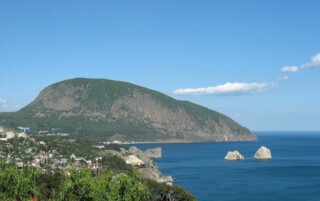By the Warm Sea
Alessandra Hay
One of the first colour documentaries to come out of the Soviet Union was a short propaganda film released in 1940 called By the Warm Sea. It was about Artek, the Young Pioneer summer camp in Crimea. The documentary intersperses shots of the landscape with clips of camp life: groups of fit, happy children in Pioneer uniforms learning to fire guns, playing volleyball, helping each other with the communal work, swimming naked in the sea, dancing in red leotards and white caps.
It isn’t difficult to understand why Artek’s spectacular location – between Ayu-Dag (Bear Mountain) and the glassy waters of the Black Sea – was chosen for the camp, whose purpose was to ‘educate the citizens of a socialist society’. Artek no longer uses this slogan and the Young Pioneers were disbanded in 1991 but the camp is still running and in May 2022 a new organisation, the All-Russian Young Pioneers, was created.
Following Russia’s full-scale invasion of Ukraine last year, Artek, along with other summer camps in Crimea, offered free two-week holidays to Ukrainian children. Months later, hundreds of children were still at the camps, their return home ‘postponed indefinitely’ as their parents worked with charities and the Ukrainian authorities to try to get them home. Artek’s new slogan is ‘Artekovite today, Artekovite forever!’
I went to Artek in 2010, when I was 11. I was born in Moscow but moved to the UK when I was six; my parents thought the summer camp would be a good way for me to keep up my Russian. Like the grand halls of Kyiv’s Metro stations, which are still decorated with chandeliers, mosaics and the occasional red star or relief of Lenin’s profile, Artek had changed very little in the seventy years since the filming of By the Warm Sea.
We filed out onto the tarmac each morning at seven o’clock to do a series of aerobic exercises that I had only ever seen pregnant women do in the pool. Every other evening there was a mandatory three-hour mass performance. Groups of campers would take it in turns to perform the spektakl while everyone else watched. Opting out wasn’t possible. I found it excruciating but most of the children seemed to enjoy it and take pride in it.
On 24 August, Ukrainian Independence Day, Artek and its director, Konstantin Fedorenko, were sanctioned by the US government for holding Ukrainian children at the camp against their will and putting them into ‘patriotic re-education’ programmes. The camp claimed that it was too dangerous to return the children to their parents because of developments on the front line. Some parents crossed into Russia to make their way to the occupied territory; others couldn’t afford the journey and were left waiting for months. In May, the charity Save Ukraine returned 17 children. There are fears that many more are still at the camp but their parents are afraid to turn to the Ukrainian authorities for fear they will be punished for sending their children to a camp in occupied territory.
In interviews, the returned children said that on arriving at the summer camp – where they’d gone voluntarily – they were told they were in ‘prison’. They had to learn and perform ‘Onward Russia!’ to the point of exhaustion. One boy said that as soon as they arrived they were told they would be punished if they spoke Ukrainian. He tries to tell this story in faltering Ukrainian but eventually gives up and switches to Russian. He is the only child interviewed who even tries to speak Ukrainian; the others begin and end in Russian. Why were Ukrainian children, from Russian-speaking backgrounds, who were willing to travel to Russian occupied territory, being punished for using a language they can barely speak?
I have friends in Lviv, where I currently live, who haven’t spoken Russian since the full-scale invasion and, after a year and half, say they are now forgetting it completely. The city is covered with blue and yellow flags. In Kharkiv, by contrast, people still speak Russian and instead of Ukrainian flags it is more common to see empty advertising billboards plastered over with signs that say: ‘Kharkiv zhive!’ (‘Kharkiv lives on!’) When I was there a few months ago I met a met who was putting in new windows, all paid for by the British charity KHARPP. He told me that when his village had become too dangerous he sent his daughter to stay with relatives in Russia. They told her that there was no war in Ukraine and Ukraine was bombing itself.

Comments